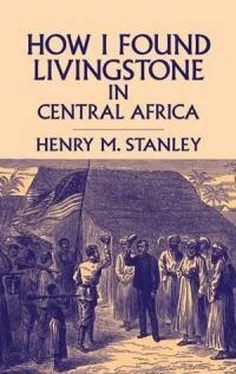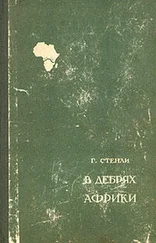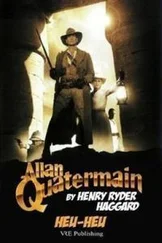Генри Стенли - How I Found Livingstone
Здесь есть возможность читать онлайн «Генри Стенли - How I Found Livingstone» весь текст электронной книги совершенно бесплатно (целиком полную версию без сокращений). В некоторых случаях можно слушать аудио, скачать через торрент в формате fb2 и присутствует краткое содержание. Год выпуска: 1872, Жанр: Биографии и Мемуары, на английском языке. Описание произведения, (предисловие) а так же отзывы посетителей доступны на портале библиотеки ЛибКат.
- Название:How I Found Livingstone
- Автор:
- Жанр:
- Год:1872
- ISBN:нет данных
- Рейтинг книги:5 / 5. Голосов: 1
-
Избранное:Добавить в избранное
- Отзывы:
-
Ваша оценка:
- 100
- 1
- 2
- 3
- 4
- 5
How I Found Livingstone: краткое содержание, описание и аннотация
Предлагаем к чтению аннотацию, описание, краткое содержание или предисловие (зависит от того, что написал сам автор книги «How I Found Livingstone»). Если вы не нашли необходимую информацию о книге — напишите в комментариях, мы постараемся отыскать её.
How I Found Livingstone — читать онлайн бесплатно полную книгу (весь текст) целиком
Ниже представлен текст книги, разбитый по страницам. Система сохранения места последней прочитанной страницы, позволяет с удобством читать онлайн бесплатно книгу «How I Found Livingstone», без необходимости каждый раз заново искать на чём Вы остановились. Поставьте закладку, и сможете в любой момент перейти на страницу, на которой закончили чтение.
Интервал:
Закладка:
To a new-comer into Africa, the Muscat Arabs of Zanzibar are studies. There is a certain empressement about them which we must admire. They are mostly all travellers. There are but few of them who have not been in many dangerous positions, as they penetrated Central Africa in search of the precious ivory; and their various experiences have given their features a certain unmistakable air of-self-reliance, or of self-sufficiency; there is a calm, resolute, defiant, independent air about them, which wins unconsciously one's respect. The stories that some of these men could tell, I have often thought, would fill many a book of thrilling adventures.
For the half-castes I have great contempt. They are neither black nor white, neither good nor bad, neither to be admired nor hated. They are all things, at all times; they are always fawning on the great Arabs, and always cruel to those unfortunates brought under their yoke. If I saw a miserable, half-starved negro, I was always sure to be told he belonged to a half-caste. Cringing and hypocritical, cowardly and debased, treacherous and mean, I have always found him. He seems to be for ever ready to fall down and worship a rich Arab, but is relentless to a poor black slave. When he swears most, you may be sure he lies most, and yet this is the breed which is multiplied most at Zanzibar.
The Banyan is a born trader, the beau-ideal of a sharp money-making man. Money flows to his pockets as naturally as water down a steep. No pang of conscience will prevent him from cheating his fellow man. He excels a Jew, and his only rival in a market is a Parsee; an Arab is a babe to him. It is worth money to see him labor with all his energy, soul and body, to get advantage by the smallest fraction of a coin over a native. Possibly the native has a tusk, and it may weigh a couple of frasilahs, but, though the scales indicate the weight, and the native declares solemnly that it must be more than two frasilahs, yet our Banyan will asseverate and vow that the native knows nothing whatever about it, and that the scales are wrong; he musters up courage to lift it-it is a mere song, not much more than a frasilah. "Come," he will say, "close, man, take the money and go thy way. Art thou mad?" If the native hesitates, he will scream in a fury; he pushes him about, spurns the ivory with contemptuous indifference, — never was such ado about nothing; but though he tells the astounded native to be up and going, he never intends the ivory shall leave his shop.
The Banyans exercise, of all other classes, most influence on the trade of Central Africa. With the exception of a very few rich Arabs, almost all other traders are subject to the pains and penalties which usury imposes. A trader desirous to make a journey into the interior, whether for slaves or ivory, gum-copal, or orchilla weed, proposes to a Banyan to advance him $5,000, at 50, 60, or 70 per cent. interest. The Banyan is safe enough not to lose, whether the speculation the trader is engaged upon pays or not. An experienced trader seldom loses, or if he has been unfortunate, through no deed of his own, he does not lose credit; with the help of the Banyan, he is easily set on his feet again.
We will suppose, for the sake of illustrating how trade with the interior is managed, that the Arab conveys by his caravan $5,000's worth of goods into the interior. At Unyanyembe the goods are worth $10,000; at Ujiji, they are worth $15,000: they have trebled in price. Five doti, or $7.50, will purchase a slave in the markets of Ujiji that will fetch in Zanzibar $30. Ordinary menslaves may be purchased for $6 which would sell for $25 on the coast. We will say he purchases slaves to the full extent of his means-after deducting $1,500 expenses of carriage to Ujiji and back-viz. $3,500, the slaves-464 in number, at $7-50 per head- would realize $13,920 at Zanzibar! Again, let us illustrate trade in ivory. A merchant takes $5,000 to Ujiji, and after deducting $1,500 for expenses to Ujiji, and back to Zanzibar, has still remaining $3,500 in cloth and beads, with which he purchases ivory. At Ujiji ivory is bought at $20 the frasilah, or 35 lbs., by which he is enabled with $3,500 to collect 175 frasilahs, which, if good ivory, is worth about $60 per frasilah at Zanzibar. The merchant thus finds that he has realized $10,500 net profit! Arab traders have often done better than this, but they almost always have come back with an enormous margin of profit.
The next people to the Banyans_in power in Zanzibar are the Mohammedan Hindis. Really it has been a debateable subject in my mind whether the Hindis are not as wickedly determined to cheat in trade as the Banyans. But, if I have conceded the palm to the latter, it has been done very reluctantly. This tribe of Indians can produce scores of unconscionable rascals where they can show but one honest merchant. One of the honestest among men, white or black, red or yellow, is a Mohammedan Hindi called Tarya Topan. Among the Europeans at Zanzibar, he has become a proverb for honesty, and strict business integrity. He is enormously wealthy, owns several ships and dhows, and is a prominent man in the councils of Seyd Burghash. Tarya has many children, two or three of whom are grown-up sons, whom he has reared up even as he is himself. But Tarya is but a representative of an exceedingly small minority.
The Arabs, the Banyans, and the Mohammedan Hindis, represent the higher and the middle classes. These classes own the estates, the ships, and the trade. To these classes bow the half-caste and the negro.
The next most important people who go to make up the mixed population of this island are the negroes. They consist of the aborigines, Wasawahili, Somalis, Comorines, Wanyamwezi, and a host of tribal representatives of Inner Africa.
To a white stranger about penetrating Africa, it is a most interesting walk through the negro quarters of the Wanyamwezi and the Wasawahili. For here he begins to learn the necessity of admitting that negroes are men, like himself, though of a different colour; that they have passions and prejudices, likes and dislikes, sympathies and antipathies, tastes and feelings, in common with all human nature. The sooner he perceives this fact, and adapts himself accordingly, the easier will be his journey among the several races of the interior. The more plastic his nature, the more prosperous will be his travels.
Though I had lived some time among the negroes of our Southern States, my education was Northern, and I had met in the United States black men whom I was proud to call friends. I was thus prepared to admit any black man, possessing the attributes of true manhood or any good qualities, to my friendship, even to a brotherhood with myself; and to respect him for such, as much as if he were of my own colour and race. Neither his colour, nor any peculiarities of physiognomy should debar him with me from any rights he could fairly claim as a man. "Have these men-these black savages from pagan Africa," I asked myself, "the qualities which make man loveable among his fellows? Can these men-these barbarians-appreciate kindness or feel resentment like myself?" was my mental question as I travelled through their quarters and observed their actions. Need I say, that I was much comforted in observing that they were as ready to be influenced by passions, by loves and hates, as I was myself; that the keenest observation failed to detect any great difference between their nature and my own?
The negroes of the island probably number two-thirds of the entire population. They compose the working-class, whether enslaved or free. Those enslaved perform the work required on the plantations, the estates, and gardens of the landed proprietors, or perform the work of carriers, whether in the country or in the city. Outside the city they may be seen carrying huge loads on their heads, as happy as possible, not because they are kindly treated or that their work is light, but because it is their nature to be gay and light-hearted, because they, have conceived neither joys nor hopes which may not be gratified at will, nor cherished any ambition beyond their reach, and therefore have not been baffled in their hopes nor known disappointment.
Читать дальшеИнтервал:
Закладка:
Похожие книги на «How I Found Livingstone»
Представляем Вашему вниманию похожие книги на «How I Found Livingstone» списком для выбора. Мы отобрали схожую по названию и смыслу литературу в надежде предоставить читателям больше вариантов отыскать новые, интересные, ещё непрочитанные произведения.
Обсуждение, отзывы о книге «How I Found Livingstone» и просто собственные мнения читателей. Оставьте ваши комментарии, напишите, что Вы думаете о произведении, его смысле или главных героях. Укажите что конкретно понравилось, а что нет, и почему Вы так считаете.












